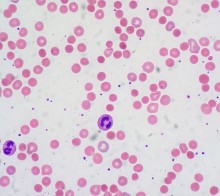Yes, anaemia could cause infertility. Unfortunately, there have not been enough studies carried out to conclusively link fertility problems and anaemia at this moment in time.
There was a study though, which found that there could be a possible link between infertility and a deficiency in iron. The study found out that women not taking an iron supplement were experiencing fertility problems that were associated with ovarian failure. It is actually important though, that other factors be taken into consideration. The study also found that a woman not taking an iron supplement tended to smoke cigarettes, exercised less, and had a higher body weight. These factors could all be associated with fertility problems.
For a woman who wants to conceive, most doctors will recommend preventing or treating anaemia. A deficiency in iron can also affect a woman's pregnancy. Anaemia could cause premature babies or a low weight at birth. There are some things that can be done to treat or prevent anaemia for women wanting to conceive or who are already pregnant. Always discuss this issue with your doctor first.
1. An iron supplement can be taken daily: Iron supplements should be taken before meals to reduce any discomfort. They should not be taken before bedtime. It is best to start taking a lower dose until your system adjusts.
2. Eat foods that are iron rich: Iron-fortified grains, seeds, nuts, peas, beans, dried fruits, liver, poultry, broccoli, kale and spinach are good sources of an iron rich diet that will help with an anaemic system.
If a woman is concerned about being anaemic and possibly experiencing fertility problems because of this, it is always important that she discuss her concerns with her doctor. Quite often there could be other health conditions that could be causing her infertility.
There was a study though, which found that there could be a possible link between infertility and a deficiency in iron. The study found out that women not taking an iron supplement were experiencing fertility problems that were associated with ovarian failure. It is actually important though, that other factors be taken into consideration. The study also found that a woman not taking an iron supplement tended to smoke cigarettes, exercised less, and had a higher body weight. These factors could all be associated with fertility problems.
For a woman who wants to conceive, most doctors will recommend preventing or treating anaemia. A deficiency in iron can also affect a woman's pregnancy. Anaemia could cause premature babies or a low weight at birth. There are some things that can be done to treat or prevent anaemia for women wanting to conceive or who are already pregnant. Always discuss this issue with your doctor first.
1. An iron supplement can be taken daily: Iron supplements should be taken before meals to reduce any discomfort. They should not be taken before bedtime. It is best to start taking a lower dose until your system adjusts.
2. Eat foods that are iron rich: Iron-fortified grains, seeds, nuts, peas, beans, dried fruits, liver, poultry, broccoli, kale and spinach are good sources of an iron rich diet that will help with an anaemic system.
If a woman is concerned about being anaemic and possibly experiencing fertility problems because of this, it is always important that she discuss her concerns with her doctor. Quite often there could be other health conditions that could be causing her infertility.

